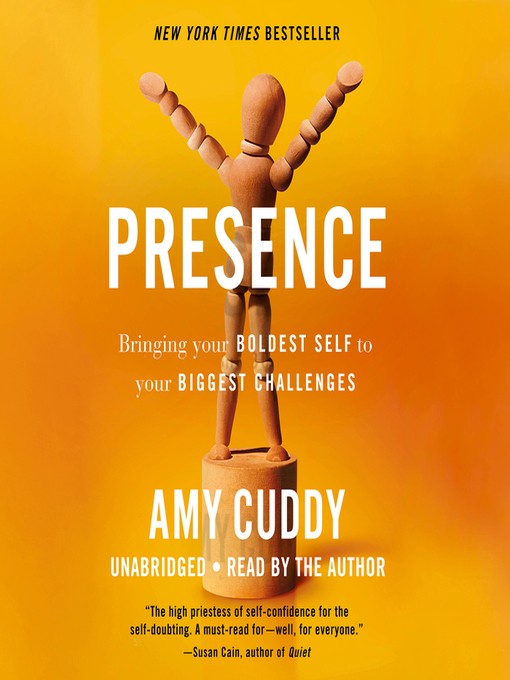
Presence
Bringing Your Boldest Self to Your Biggest Challenges
کتاب های مرتبط
- اطلاعات
- نقد و بررسی
- دیدگاه کاربران
نقد و بررسی

December 21, 2015
Cuddy, a professor at Harvard Business School, expands on her popular TED talk about adopting confident body postures, or "power poses," to enhance self-confidence and bring presence to social and professional situations. She defines presence as "feeling connected with our own thought, values, abilities, and emotions, so that we can better connect with... others." Drawing insights from successful venture capitalists and from a host of social psychology studies conducted by herself and others, Cuddy discusses self-affirmation, the role hormones play in confidence, mood enhancement via facial expression, and reinterpreting anxiety as excitement. She uses William James's belief that physical experiences trigger emotional states to lend credence to her own invention of power poses, providing specific instructions on how and when to use them. Further inspiration is provided by Cuddy's interviews with actress Julianne Moore about presence on film sets, Rev. Jeffrey Brown on his work reining in gang violence through active listening, and author Neil Gaiman on overcoming "imposterism." Lest the reader remain unconvinced, Cuddy concludes with letters from admirers who have used her methods effectively during job interviews, business meetings, and athletic events, as well as to overcome PTSD. Agent: Richard Pine, Inkwell Management.

An examination of the psychological and physiological mechanics that spark the precious, transitory sense of presence. "Presence, as I mean it throughout these pages," writes social psychologist Cuddy (Business Administration/Harvard Business School), "is the state of feeling connected with our own thoughts, values, abilities, and emotions, so that we can better connect with the thoughts, values, abilities, and emotions of others. That's it." That may be it, but it's a tall order, since presence is an exquisite synchrony of the senses and the various elements of the self in harmony, as difficult to put into words as rapture or the flow state. It's all about poise, emerging from a trust and belief in yourself, your values, and your feelings. Cuddy--whose 2012 TED talk about the significance of body language has been viewed more than 27 million times (second among the most-viewed TED talks)--seeks presence in the face of powerlessness before pressure, anxiety, confusion, and frustration. However, to describe this fleeting sense of command, the author has to break it down into its components, severing the threads that hold the feeling together. Cuddy is very sharp in her analysis of those parts: affirmation; body language; how to nudge yourself along via incremental changes; how to shut up and listen; the profound disharmony of post-traumatic stress, when synchrony is painful to even contemplate. But the author stumbles somewhat when putting the pieces back together in a working union. Honesty, sincerity, and authenticity are batted around in pursuit of realizing our values and traits, but these words are too easily open to self-deception to feel like genuine tools. Cuddy falls back too often on the unchallenged insights of "a widely recognized expert" as well as unhelpful diagnostic questions--e.g., "What three words best describe you as an individual?" An uneven book studded with genuine insights that public speakers will find useful. COPYRIGHT(1) Kirkus Reviews, ALL RIGHTS RESERVED.

Starred review from January 1, 2016
Readers may be familiar with social psychologist Cuddy (business administration, Harvard Business Sch.) through her TED Talk in which she discussed how our body language shapes who we are. Here, Cuddy expands on that conversation with a thorough discussion of the concept of presence, meaning a confident physical presentation that adds to mental confidence. While presence doesn't guarantee a specific outcome, developing it allows us to face our challenges without anxiety. Presence also helps us leave a situation without second-guessing our responses. It eliminates feelings of inferiority by shedding the fear of being exposed as imposters. Drawing heavily on her own experiences overcoming a traumatic brain injury and from those of average people, Cuddy shows how employing simple techniques lessen the anxiety experienced when faced with a challenging situation. Presence encourages us to be our authentic selves and operate ultimately from a place of personal power, not fear. A background in psychology is not necessary to understanding the material. Additionally, ample references to academic research further reinforce the content and will be of interest to psychology students. Personal narratives throughout the book support the author's ideas. VERDICT Given the popularity of Cuddy's TED Talk, one would expect that this book will be in demand, and readers will not be disappointed.--Lydia Olszak, Bosler Memorial Lib., Carlisle, PA
Copyright 2016 Library Journal, LLC Used with permission.

























دیدگاه کاربران